
For Biden, Black Secretaries Trail Black Votes: Jan. 14 Joint Center Roundup
Legislators Call for Trump’s Removal After Capitol Attack
Trump Impeached: President Donald Trump becomes the first president to be impeached twice after a final vote of 232-197 (including all House Democrats and 10 House Republicans in favor of impeachment). The article charges Trump with “incitement of insurrection” and states that his rhetoric “encouraged—and foreseeably resulted in—lawless action at the Capitol.” The vote comes after several CBC Members and the NAACP called for the impeachment of the president. Senator Tim Scott (R-SC), the only Black Republican in the Senate, opposed impeaching Trump noting it “will only lead to more hate and a deeply fractured nation” and will “fly in direct opposition to what President-elect Joe Biden has been calling for all year.”
Many speculate that it’s “extremely unlikely that Trump will be removed from office through impeachment” since Senate Majority Leader Mitch McConnell will not allow the Senate to reconvene until January 19, a day before the inauguration.
CBC Speaks Out: The Congressional Black Caucus hosts a hearing with civil rights organizations, including National Action Network, National Urban League, and more, to respond to the domestic terror attack at the U.S. Capitol.
Incoming Leaders Call for More Stimulus
Biden Unveils $1.9 trillion stimulus plan: The plan calls for $1,400 checks for those under certain incomes (in addition to the $600 checks approved last month), extending the federal unemployment insurance supplement an additional 6 months through the end of September, $170 billion for schools, $350 billion for state, local, and tribal governments, $15 billion for grants to small businesses, and $160 billion for vaccinations, testing, and public health jobs. The plan would also expand paid leave and child care tax credits, and increase the federal minimum wage from $7.25 to $15 per hour. The Washington Post has posted President-elect Biden’s 19-page summary of the plan. Many of the provisions are consistent with the Joint Center’s proposals in our 2020 report Pandemic Relief Priorities for Black Communities.
Incoming Majority Leader Schumer backs additional support: The push for $2,000 stimulus checks resumes as Democrats assume control of the Senate. “One of the first things that I want to do when our new senators are seated is deliver the $2,000 checks to the American families,” said Senator Charles Schumer (D-NY), who will become the Senate Majority Leader.
Biden Transition News
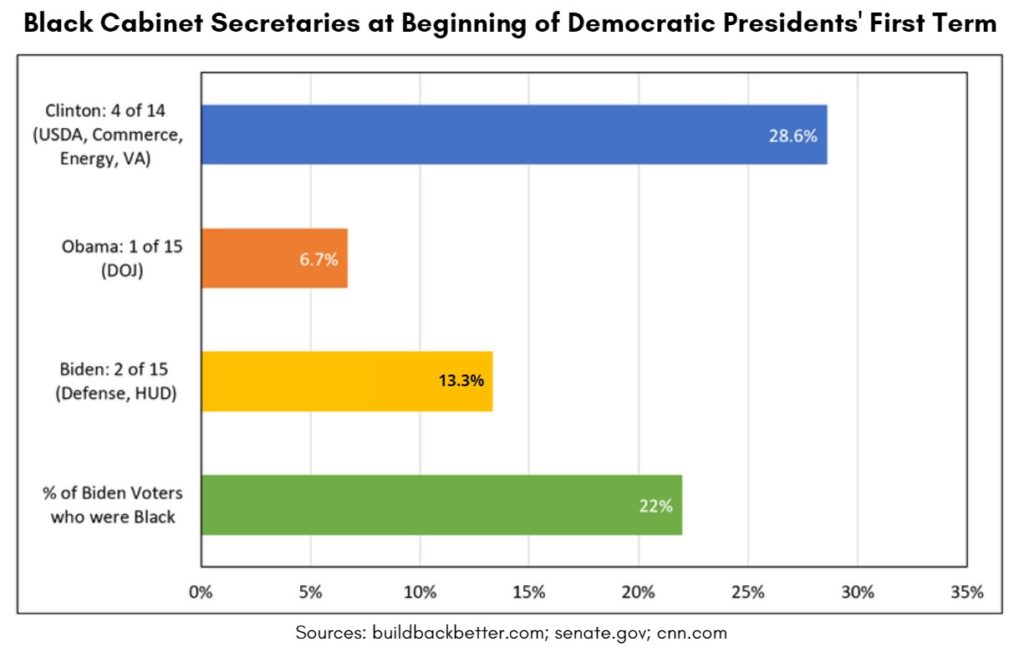
Biden Black Cabinet Secretary Nominations Trail Behind Clinton’s Nominations and Biden’s Share of Black Voters: President-elect Biden nominated Lloyd Austin as Secretary of Defense and Marcia Fudge as Secretary of Housing and Urban Development, filling 2 of the 15 available positions with Black Cabinet Secretaries. His nominations fall behind both President Clinton who nominated 4 Black Cabinet Secretaries out of the 14 spots available at the beginning of his first term and the 22 percent of Biden voters who are Black.

Biden chooses Don Graves as his nominee to serve as Deputy Secretary of the Commerce Department: Graves is currently the Head of Corporate Responsibility and Community Relations at KeyBank. Previously, Don served as the Executive Director of the President’s Council on Jobs and Competitiveness under President Barack Obama and led the federal government’s recovery efforts in Detroit. In a press statement, Joint Center President Spencer Overton said “Don brings years of recognized expertise and leadership on economic policy issues that are important to Black communities. His efforts to rebuild Detroit after its bankruptcy, assist then-Vice President Biden with the 2009 Recovery Act, and drive initiatives that bring financial services to more communities all demonstrate his leadership, values, and commitment. The Joint Center looks forward to continuing to work with Don in his new capacity as we rebuild our economy in a way that prioritizes racial equity and opportunity.”
Diversity & Inclusion in the White House: Biden nominates Michael Leach as the first-ever Chief Diversity & Inclusion Director for the White House and Catherine Lhamon as the Deputy Director of the Domestic Policy Council for Racial Justice and Equity. Prior to his new role, Leach served as the Chief People, Diversity, & Inclusion Officer on the Biden-Harris Campaign where “he led the campaign’s strategic vision, planning, and implementation of staff diversity & inclusion efforts, talent acquisition, and leadership development.” Lhamon is currently the Chair of the U.S. Commission on Civil Rights, and was appointed to a six-year term by President Obama in 2016.
Other Biden-Harris White House Appointments: The Biden-Harris transition announces several Black staff taking on key White House roles, including Vincent Evans as Deputy Director of the Office of Public Engagement and Intergovernmental Affairs, Deanne Millison as Deputy Policy Director, Samiyyah Ali as Deputy Associate Counsel, Funmi Olorunnipa Badejo as Associate Counsel, Tona Boyd as Special Counsel, Justin Dews as Deputy Associate Counsel, Jaimie McFarlin as Deputy Associate Counsel, Lauren Moore as Associate Counsel, Nadiya Beckwith-Stanley as Special Assistant to the President for Budget and Tax Policy, and Jahi Wise as Senior Advisor for Climate Policy and Finance.

Hope for education policy: Higher education leaders are hopeful that Miguel Cardona, President-elect Biden’s nominee for Secretary of Education, will enact policies to reduce disparities in access to and resources for higher education, including providing not just entitlement funding but also grants to HBCUs to support research with an emphasis on STEM (science, technology, engineering, and math) education.
Black doctors matter: Being under the care of Black doctors cuts the Black infant mortality rate by more than half according to researchers studying births in Florida over a 23-year period.
COVID-19
Vaccine disparities: Despite COVID-19’s disproportionate impact on Black communities, white people in states with high percentages of Black residents have received most of the coronavirus vaccinations to date.
How can I help? St. Matthew Baptist Church in Jacksonville, FL plans to convert to a COVID-19 vaccination site, with the goal of increasing the number of vaccinations in the church’s predominantly Black community.
Leading by example: HBCUs, including Howard University, are playing a leadership role in educating Black communities about the safety and effectiveness of coronavirus vaccines, with several HBCU leaders participating in vaccine trials and taking the vaccine live on television and social media platforms.
Economic Policy
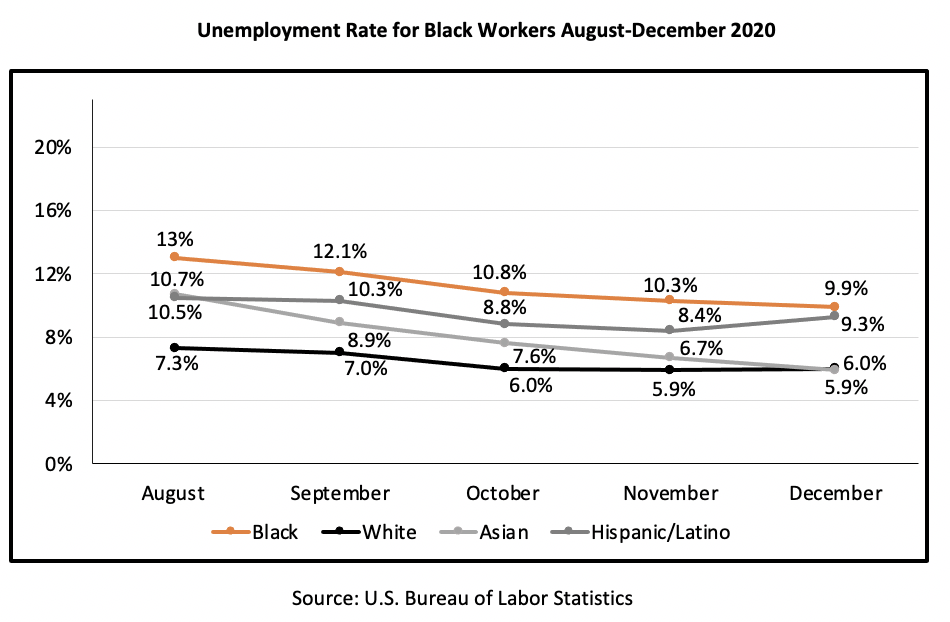
Black women lost jobs in December: The December unemployment rate was highest for Black workers (9.9 percent) followed by Latinas/os (9.3 percent), whites (6.0 percent), and Asians (5.9 percent). The overall unemployment rate was 6.7 percent, unchanged from November. As Joint Center Vice President Jessica Fulton points out, Black and Latina women accounted for nearly all of the jobs lost in December.
$2 trillion needed for workers: Unemployment claims for the week ending January 2 totaled 787,000, still significantly higher than the pre-pandemic weekly claims record of 695,000 set in 1982. Noting unemployment hit Black and Latina/o workers hardest, the Economic Policy Institute urges Congress to allocate an additional $2.1 trillion in fiscal support. Black and Latina/o workers make up a large share of workers in industries most affected by recent additional COVID-19 closures and restrictions.
Eviction cliff: People of color are disproportionately affected by COVID-19, unemployment, and housing instability, notes the Urban Institute in a new brief on the looming evictions cliff. Pointing to the general distrust between Black homeowners and mortgage lenders, HomeFree-USA founder Marcia Griffin urges lenders and borrowers to do more to ensure that Black homeowners file for COVID-19 mortgage forbearance relief.
Missed opportunity: Investing in Black-owned businesses will accelerate the economic recovery, argues Brookings, noting that “the underrepresentation of Black businesses is costing the U.S. economy millions of jobs and billions of dollars in unrealized revenues.”
Future of Work & Learning
Job segregation starts with policy: To address the racial wealth gap, look closer at how workforce policy maintained white privilege, argue Workforce Development Council of Seattle-King County CEO Marie Kurose and Center for American Progress Senior Fellow Livia Lam. A significant racial wealth gap still exists despite skill attainment and training programs for people of color, they note.
Hill Diversity
After Georgia, Senate must diversify top staff: Black voters make up about 50 percent of Georgia’s Democratic voters, and allowed Democrats to take the Senate. In an op-ed for Morning Consult, the Joint Center’s Dr. LaShonda Brenson and Spencer Overton argue that Senators should now: 1) prioritize diversity in hiring and promotion; 2) follow the lead of the U.S. House and create a Bipartisan Senate Diversity Office; and 3) eliminate the vestiges of excluding top staff of color by supporting strong candidates of color to chair agencies like the FTC and FCC even if they lack Senate staff experience.
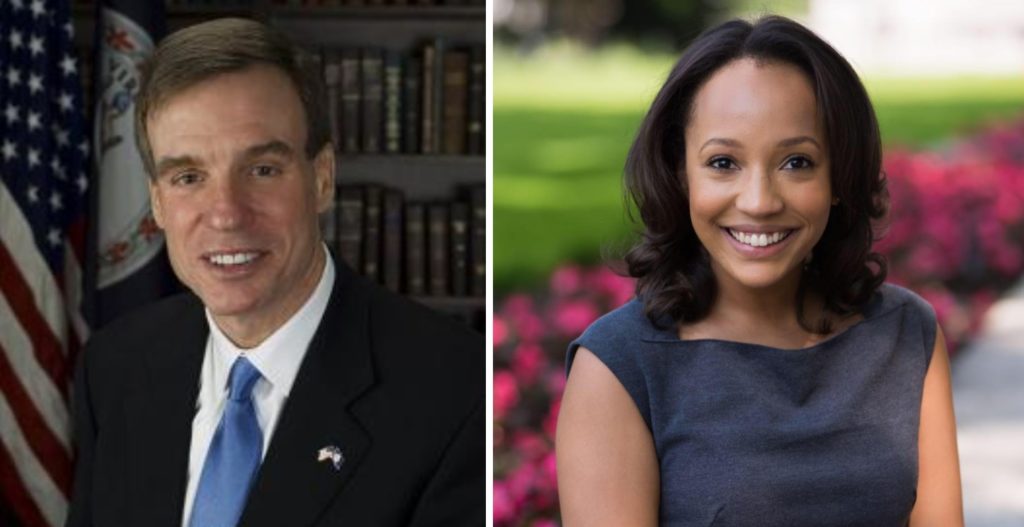
Senator Warner leads on top staff diversity: The Joint Center commends U.S. Senator Mark Warner (D-VA) for promoting Lauren Marshall to legislative director in his personal office. Marshall is one of three current Black legislative directors in the U.S. Senate. With the addition of Marshall, African Americans will account for 2.1 percent of the approximately 340 top Senate staffers in Washington, DC who serve as chiefs of staff, legislative directors, communications directors, or full committee staff directors (African Americans account for over 13 percent of the U.S. population).
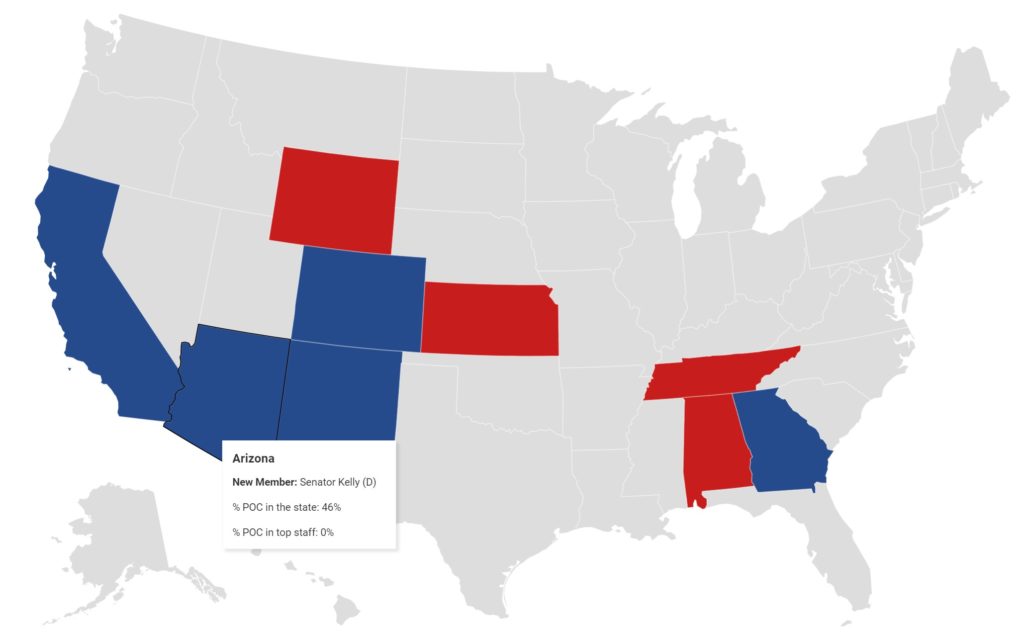
Report card on top staff diversity of newly-elected Members: As of January 14, the Joint Center’s report card tracking top staff hires by each new Member in the 117th Congress illustrates that 149 of 210 (or 70.9 percent) of the possible positions have already been filled. Of Members who have hired all three top spots, so far Ben Ray Luján (D-NM) leads in the Senate and Marilyn Strickland (D-WA) leads in the House. Those at the bottom of the lists are Senator Mark Kelly (D-AZ) and Rep. Jay Obernolte (R-CA). Of the top staff hired by new Members so far, 24.8 percent are people of color, and 6 percent are African American. People of color account for 40 percent of the U.S. population and African Americans account for 13.4 percent of the U.S.
Supporting congressional staff: The Joint Center joins a letter of support to congressional staff expressing our outrage and sadness regarding the attack on Capitol Hill last week. Along with 15 other organizations, we are collecting and sharing information and resources with congressional staff during this difficult time.
Tech Policy
Diversify tech policy: Democratic leaders are pressing the Biden Administration to appoint leaders of color for federal agencies that oversee the tech industry. Making diversity a priority is crucial for federal debates about algorithmic bias, the digital divide, and more. These debates have implications for Black Americans who are disproportionately impacted by the lack of access to broadband and who face erroneous consequences because of facial recognition technology.
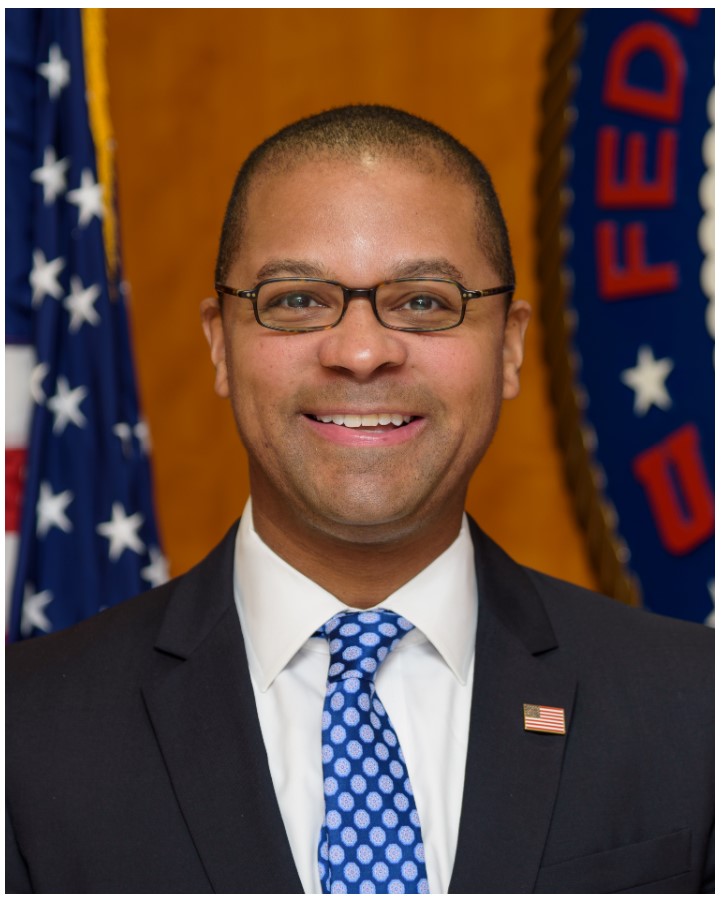
CBC Members push for Geoffrey Starks as FCC Chair: Politico reported that Rep. Emanuel Cleaver, many other CBC Members, and several other civil rights organizations such as the National Action Network, NAACP, the Joint Center, and the Southern Rural Black Women’s Initiative are supporting Starks to be the permanent FCC Chair. Joint Center President Spencer Overton was quoted as saying that “Commissioner Starks is the strongest candidate on issues related to inclusion, equality, and communities of color.” Commissioner Starks was the headline speaker last year on a Joint Center roundtable on broadband and Black communities in the wake of the pandemic.

Internet no longer a luxury: Experts are calling for changes in national technology policy to bring greater economic opportunities to Black communities as COVID-19 amplifies the need to consider internet access a household necessity.
Joint Center Lectures at Harvard Law School on Public Interest Tech Policy: Joint Center President Spencer Overton spoke to Harvard Law School students about Section 230 of the Communications Decency Act and civil rights.
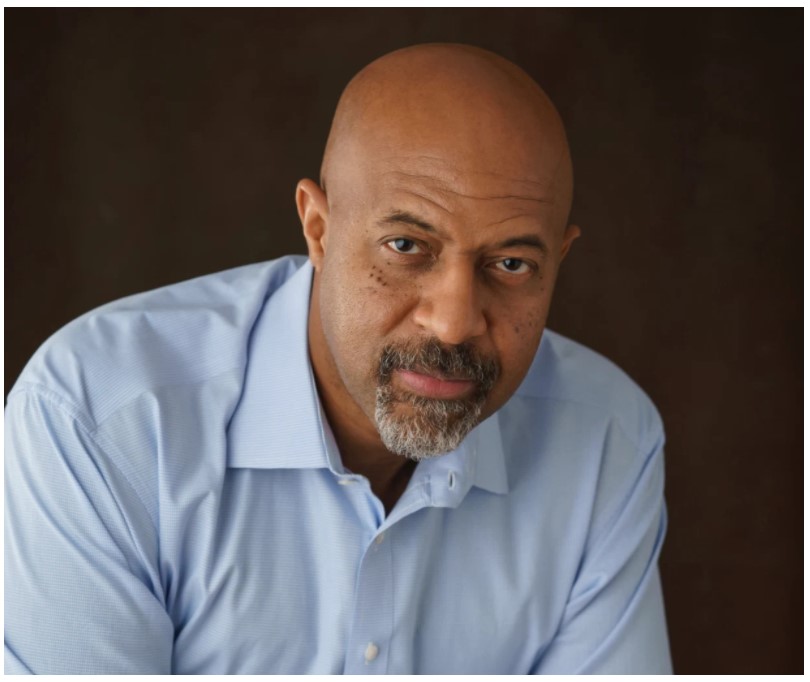
Facebook Appoints Roy Austin as Vice President for Civil Rights: Roy has 25 years experience working as a civil rights lawyer and advocate, including serving as the Deputy Assistant to the President for the Office of Urban Affairs, Justice, and Opportunity in the Obama White House and Deputy Assistant Attorney General of Civil Rights in the U.S. Justice Department.
Movement Building
The Advancement Project, NAACP, National Urban League, and several other leading civil rights and racial justice organizations release a statement denouncing domestic terrorism after last Wednesday’s attempted coup at the U.S. Capitol.
Color of Change President Rashad Robinson releases a statement addressing Facebook’s announcement to suspend President Trump’s Facebook and Instagram accounts indefinitely stating, “(t)he Biden-Harris administration and incoming Congress must create and enforce new rules to reign in the outsize power of Big Tech and hold companies like Facebook accountable for their role in harming Black communities and our democracy.”
Black Futures Lab launches a digital project to thank Black organizers for their dedication to engaging and registering Black voters in the Georgia Senate run-off elections.
Louisiana Fair Housing Action Center hosts a virtual Fair Housing Summit to discuss the connections between “housing discrimination, segregation, environmental racism, COVID-19, gentrification, policing, and the eviction crisis,” with housing justice advocates and community leaders.
The Transgender Law Center creates a digital care package that includes a guided meditation, poetry, music, and a short film.
Events
“The Biden Administration: The First 100 days” (Bloomberg Government, January 15); “Using Data for Justice: How Changemakers Can Center Racial Equity in COVID-19 Recovery” (Urban Institute, January 25); “Cancelling Rent and Promoting Housing Stability in Greater DC” (Urban Institute, January 27); “There is Power in Being Counter Culture: Displaced Belief = Defeat” (SisterReach, January 28; “The Biden Administration’s Future Agenda” (New America, February 3).
Last week, events were held by the Brookings Institution, the Congressional Black Caucus, Othering & Belonging Institute, and the Tax Policy Center.
Podcasts
Keeping the American Dream within Reach (WorkingNation)
A Historic Night in Georgia (The New York Times)
The Joint Center thanks the Annie E. Casey Foundation, the Boulé Foundation, the Democracy Fund, Toyota Motor North America, Inc., UPS, and the Walmart Foundation for additional support that has allowed us to do some of our COVID-19 and Black Communities work.
To receive the Joint Center’s emails, sign-up here.




April 2024 Jobs Day Analysis